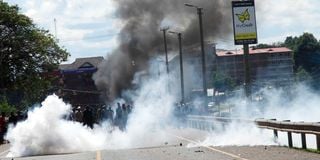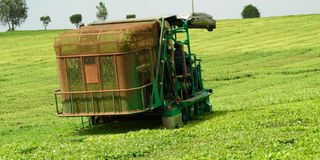Revealed: Powerful mix of triggers behind violence in Kericho tea zones

Protesters buried in smoke after police fired teargas to disperse them at the Brooke trading centre in Kericho on May 21.
A potent mix of historical land injustices, mechanisation and politics has fuelled unprecedented violence in multinational tea estates in the South Rift region in recent weeks.
Burning of tea plucking machines, invasions of tea plantations and illegal tea harvesting, which resulted in two deaths by drowning as residents fled from police, rocked parts of Bomet and Kericho counties.
In the aftermath, a total of 23 police officers and a journalist were injured, while five residents sustained gunshot wounds as a result of the chaos that rocked the region.
The Ekaterra tea company has since announced that it will cease operations until the prevailing insecurity is resolved, putting the jobs of 16,000 workers at risk.
James Finlays Kenya has increased the number of police officers on its estates in the wake of the attacks, which included the burning of a police vehicle on the estates by rioting youths seeking to harvest tea illegally.
But what exactly has fuelled the violence?
Tea plantations were introduced to the region in the early 1920s, and the Kipsigis and Talai communities say they were evicted from their farms to pave the way for the establishment of the plantations by British citizens.

Workers with a mechanised tea-plucking machine in an estate on March 10. The machines were expected to increase profits for the companies.
Currently, 120,000 members of the two communities are seeking compensation from the British government for what they claim is a historical injustice in a case pending before the United Nations Human Rights Court.
King’s Counsel Rodney Dixon and Nairobi-based lawyer Joel Kimutai Bosek are the lead lawyers for the victims in the various cases that have been filed seeking compensation.
Dr Bosek said a total of 90,000 acres was taken from the Kipsigis and Talai communities under the 1902 Land Ordinance through systematic and violent discrimination facilitated by the British Army, colonialists and police.
Historical injustices
"The historical injustices against the local communities, which are one of the main reasons for the prevailing stalemate, have not been addressed despite pressure from the victims' representatives over the years," said Mr Wesley Kiprotich, the Chepchabas Ward representative.
Mr Kiprotich said: "This is a matter that needs to be investigated and resolved once and for all to prevent the escalation of disputes between the parties in the future."
The mechanisation of green leaf picking, which is the main cause of the prevailing violence, has also been exploited by politicians over the past year.
The issue has been a ticking time bomb for years, with more than 30,000 workers declared redundant by multinational companies in Bomet, Kericho and Nyamira counties.
Dr Erick Mutai, the governor of Kericho, revealed in an interview that the mechanisation standoff could be resolved by the parties involved with representatives of the local communities, leaders, trade unions and the companies involved.

A tea plucking machine in operation at a tea estate in Kericho county.
Mr Francis Atwoli, the secretary-general of the Central Organisation of Trade Unions (Cotu), said more than 200,000 direct and indirect jobs had been lost as a result of the retrenchments.
"We have repeatedly asked the companies to slow down the mechanisation, but some of them have gone full throttle and fully mechanised their tea estates, resulting in job losses and a negative impact on the local economy," Mr Atwoli said.
In the run-up to the 2022 General Election, most politicians, especially from Kericho County, rode to power on promises to the youth that once elected, they would lobby for the removal of tea plucking machines from the tea companies.
"Politics is at the heart of the dispute between the big tea estates and the locals over mechanisation. It is a fact that mechanisation in the industry creates efficiency and is economically viable," said Mr Silas Njibwakale, chairman of the Kenya Tea Growers Association (KTGA).
Modern technology
Mr Njibwakale said the use of modern technology in business was a global phenomenon that could not be stopped and was important for leaders.
The illegal harvest of green leaf sold to the Kenya Tea Development Agency (KTDA) and private tea factories has continued unabated despite an ongoing security operation led by the General Service Unit (GSU) of the National Police Service.
However, police have been accused of indiscriminately rounding up and beating residents of Bomet and Kericho counties who live adjacent to the tea estates targeted by the criminal activities.
"The police are conducting extrajudicial trials, invading people's homes, interrogating them about their family lineage while beating and inflicting serious injuries. It is sad that we are in this situation at this time and age in the country," said Mr Kipkirui Kap Telwa, a Nairobi-based lawyer.
Mr Kap Telwa said the government's investigative agencies have the means to identify, arrest and prosecute those involved in the criminal activities instead of blanket condemnation of the residents of the region, most of whom are innocent.
"Why have the police not arrested any of the so-called thieves who have allegedly been picking and selling green tea leaves in the area for the past year? It is unfortunate that even school going children have been attacked, arrested and locked up in police stations by the officers," said Mr Kap Telwa.
Determined to end the violence, authorities are currently investigating more than five politicians believed to be behind the chaos.
A number of politicians including Kericho Governor Mutai, MPs Nelson Koech (Belgut), Benjamin Langat (Ainamoi) and Brighton Yegon (Konoin) and several county assembly members have been questioned by the Directorate of Criminal Investigations (DCI) over the tea plantation invasions.
Interior Cabinet Secretary Kithure Kindiki last week vowed that politicians and businessmen involved in fuelling the standoff would be dealt with according to the law.
"Politicians involved in inciting locals to invade and vandalise properties of multinational tea companies in Kericho and Bomet will be arrested and prosecuted once the ongoing investigations are completed," Prof Kindiki said during a press briefing in Nairobi last Wednesday.
It has emerged that a protest by foreign investors over the security of their operations in Kenya and the risk of the country rolling back gains made in marketing locally produced goods on the global market triggered the latest crackdown on growing insecurity in multinational tea estates.
The affected multinationals — Ekaterra Plc and James Finlays Kenya — and other foreign investors are said to have put pressure on the government through their various embassies to respond to the invasions and restore order.
Subsequently, a directive to crack the whip on the perpetrators and restore order in the South Rift region, where invasions of tea plantations and the burning of mechanical pluckers had continued, was said to have come from the highest political office in the land.
Suspended operations
President William Ruto, angered by the turn of events when Ekaterra Plc announced that it had suspended operations, threatening the jobs of 16,000 workers as the matter took on an international dimension, is said to have ordered a security operation in the South Rift region.
"The fear among investors is that if those behind the invasion and destruction of properties in Kericho and Bomet counties succeed in their illegal act, their investments would also be at risk," a top source privy to the matter, who spoke on condition of anonymity due to the sensitivity of the matter, told the Nation in an interview.
"The ongoing security operation was given the green light by the highest administrative and political offices in the country after the ongoing stalemate over the use of mechanisation by the multinational tea companies took an unexpected criminal turn," the source added.
Another source said the invasion of tea estates had mutated from an isolated local issue to a national and international one, with global market players closely watching the development.
"The invasion of tea estates, torching of tea picking machines and illegal harvesting of green leaves not only threatened foreign investment but was increasingly seen as having great potential to set back Dr Ruto's efforts to create export markets for Kenyan produce," the source said in an interview.





